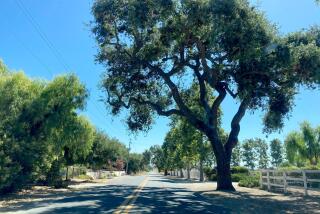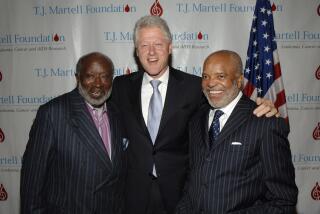Gilbert Chagoury’s response to the Los Angeles Times
- Share via
Nigerian businessman Gilbert Chagoury is a longtime friend of Bill Clinton and major donor to the Clinton Foundation who drew attention this month when a 2009 email from Clinton aide Doug Band, seeking to connect Chagoury to top State Department figures, was made public. Band wrote to Huma Abedin, a top aide to then-Secretary of State Hillary Clinton, to try to arrange a meeting for Chagoury with a U.S. diplomat to Lebanon. Abedin suggested then-Ambassador Jeffrey D. Feltman. In response to questions asked as part of a Los Angeles Times examination of Chagoury’s background and relationship to the Clintons, a spokesman, Mark Corallo, gave this detailed response:
“Gilbert Chagoury doesn’t understand all of the media concern over the Clinton Global Initiative, which has done so much good philanthropic work around the world — especially in Africa. He is proud to be associated with what he truly believes is a wonderful charitable organization.
“The last time Mr. Chagoury had any contact with Secretary Clinton was at a dinner in 2006. He has had no personal contact with Secretary Clinton or any of her staff since 2006. He has never met or had any contact with Ambassador Feltman. He had no contact of any kind with anyone from the State Department regarding the subject matter of the emails between Mr. Band and Ms. Abedin. He was simply passing along his observations and insights about the dire political situation in Lebanon at the time. But nothing ever came of it. He had no contact of any kind with the State Department.
“It should be noted that while Gilbert Chagoury is a Nigerian of Lebanese ancestry and still has a large extended family and many close friends in Lebanon, he has no business interests in Lebanon. Beyond his family and his many generous charitable works, his greatest concern is for the protection and preservation of the Christians of Lebanon and the Middle East.
The State Department is considering a deal to build a new consulate at a huge development in Lagos, Nigeria, called Eko Atlantic, which is owned by Chagoury’s family business. The project was highlighted as an innovative response to climate change by the Clinton Global Initiative.
“Eko Atlantic is a 21st Century city being built on Victoria Island adjacent to Lagos, Nigeria, to protect Victoria Island from severe erosion and to solve the chronic shortage of real estate in the world’s fastest-growing megacity. It is a gateway to emerging markets of the African continent. One of the largest land reclamation projects ever attempted and protected by an 8.5-kilometer-long sea wall to stop the catastrophic erosion, Eko Atlantic will be the size of Manhattan’s skyscraper district. Self-sufficient and sustainable, it includes state-of-the-art urban design, its own power, clean water, advanced telecommunications and state-of-the-art security. It will provide tens of thousands of jobs for Nigerians for decades to come. As such, Eko is a natural location for businesses, financial institutions and government offices. Eko Atlantic was just one of several locations being explored by the United States for its new consular facilities in Lagos. Considering its size, modern infrastructure, technology and security, it should come as no surprise that the United States government and other governments from around the world are considering Eko Atlantic as a new opportunity for locating their offices that operate in Lagos, Nigeria.
“It is important to note that Eko Atlantic began as a project to protect Victoria Island from sea erosion which had already claimed 2 kilometers of valuable land and threatened to do severe damage to Lagos itself. The Nigerian government faced a rapidly intensifying and costly crisis. At no cost to the Nigerian government, the Chagoury Group embarked on this visionary land reclamation project that is soon to be the business and financial hub of West Africa.
“As I understand it, the State Department hired a real estate search firm that conducted a multi-year assessment of properties in Lagos for the future U.S. consulate. I would refer you to the State Department to discuss their process.
In 2010, Chagoury was pulled from a plane in New Jersey and questioned because he showed up on the U.S. government’s no-fly list. He was later removed from that list. Last year, he was denied a visa to enter the U.S., according to documents and interviews, based on terrorism-related grounds, a broad category that can include suspicions — proven or not — of providing financial backing to terrorist-designated organizations.
“As to the 2010 incident, Mr. Chagoury was never told why he was placed on the no-fly list, but was pleased that after his excellent legal team at Steptoe & Johnson worked through appropriate channels, the Department of Homeland Security issued a formal, written apology to him. He did not discuss the matter nor did he seek assistance from anyone outside his legal team to resolve it and he was pleased that he was cleared by the U.S. government to fly to the United States. What he didn’t understand was the decision by someone in the U.S. government to disclose his name to the media and to unfairly suggest that he was a potential threat. That was and is false, as the government knew, which simply made the leak even harder to excuse. It caused great harm, without reason, to a man who has been a friend and supporter of America all his life.
“Any allegation that Mr. Chagoury is involved in any way with providing material support to any terrorist organization, of any stripe, is false, outrageous, and defamatory. Mr. Chagoury is prepared to take any and all action against those who would promote such outrageous and unfounded remarks.”
Hillary Clinton is exploring the outer limits of fundraising like no presidential nominee ever has
Trump’s immigration pivot: Will he be the latest Republican to alienate the base?
Why the USC/L.A. Times tracking poll differs from other surveys
More to Read
Get the L.A. Times Politics newsletter
Deeply reported insights into legislation, politics and policy from Sacramento, Washington and beyond. In your inbox three times per week.
You may occasionally receive promotional content from the Los Angeles Times.










